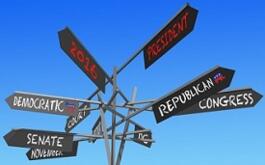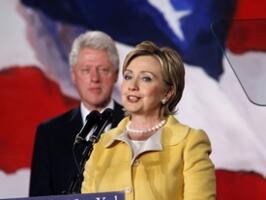Trump Change: More Voters Than Ever See Trump As Eventual GOP Nominee
Belief among Republicans that Donald Trump will be the next GOP presidential nominee now ties its highest level ever, and among all likely voters, more than ever agree.
The first Rasmussen Reports Trump Change national telephone survey of the new year finds that 74% of Likely Republican Voters think the billionaire businessman is likely to be their nominee in 2016, with 31% who say it is Very Likely. Just 23% disagree, and that includes only 11% who say it is Not At All Likely. (To see survey question wording, click here.)
Among all likely voters, 61% now say Trump is likely to be the official Republican presidential candidate, with 24% who think it is Very Likely.
Because of the Christmas and New Year’s holidays, this is our first Trump Change survey since mid-December. At that time, 66% of GOP voters said Trump is likely to win the nomination, with 27% who said it is Very Likely. Among all voters, 55% thought Trump is likely to be the nominee, including 21% who felt it is Very Likely.
Overall belief among GOP voters that Trump will be the eventual nominee hit a high of 74% in late October after running in the 50s for most weeks since Rasmussen Reports began the weekly Trump Change feature in mid-August. Following the terrorist attacks in Paris in November, this belief climbed into the 60s.
Belief among all voters that Trump is the likely nominee has ranged from 45% to 57% since August.
Trump remains tied with Democratic front-runner Hillary Clinton in a hypothetical 2016 matchup.
(Want a free daily e-mail update? If it's in the news, it's in our polls). Rasmussen Reports updates are also available on Twitter or Facebook.
The survey of 1,000 Likely U.S. Voters was conducted on January 6-7, 2016 by Rasmussen Reports. The margin of sampling error is +/- 3 percentage points with a 95% level of confidence. Field work for all Rasmussen Reports surveys is conducted by Pulse Opinion Research, LLC. See methodology.
Seventy-one percent (71%) of Republicans are looking forward to this year’s presidential contest. Among Democrats, 50% are looking forward to the race, but nearly as many (44%) have had enough of it already.
Age-wise, middle-aged voters are the strongest believers that Trump will win the GOP nomination. Men are slightly more confident in that outcome than women are, but the gap between the two is narrowing.
Sixty-seven percent (67%) of white voters think Trump is likely to be the nominee, a view shared by 42% of blacks and 49% of other minority voters.
Sixty-five percent (65%) of unaffiliated voters see Trump as the likely candidate. Democrats are evenly divided.
Among voters who Strongly Approve of the job President Obama is doing, just 37% think Trump is likely to win the Republican nomination. Among those who Strongly Disapprove of the president’s job performance, 79% see Trump as the likely nominee.
In mid-December following the most recent GOP debate, Trump still held a double-digit lead over his closest competitor, Senator Ted Cruz, in the race for the Republican presidential nomination. His voters also are by far the least likely to say they’re going to change their minds between now and when their state primary is held.
When Hillary Clinton recently criticized Trump as “a sexist,” he countered by saying she had long been protecting a sexual abuser of women, referring to her husband’s history of extramarital affairs including one with White House intern Monica Lewinsky which led to his impeachment. This exchange came just before Bill Clinton began campaigning for his wife. Just 36% of all voters now think the former president will help his wife’s run for the presidency, down from 54% two years ago.
Most voters here still don’t care too much for Russian President Vladimir Putin but don’t think Putin's recent praise of Trump will hurt the latter’s bid for the presidency. At the same time, voters agree with Trump that the deteriorating relationship between the United States and Russia is not good for America.
Additional information from this survey and a full demographic breakdown are available to Platinum Members only.
Please sign up for the Rasmussen Reports daily e-mail update (it’s free) or follow us on Twitter or Facebook. Let us keep you up to date with the latest public opinion news.
The survey of 1,000 Likely U.S. Voters was conducted on January 6-7, 2016 by Rasmussen Reports. The margin of sampling error is +/- 3 percentage points with a 95% level of confidence. Field work for all Rasmussen Reports surveys is conducted by Pulse Opinion Research, LLC. See methodology.
Rasmussen Reports is a media company specializing in the collection, publication and distribution of public opinion information.
We conduct public opinion polls on a variety of topics to inform our audience on events in the news and other topics of interest. To ensure editorial control and independence, we pay for the polls ourselves and generate revenue through the sale of subscriptions, sponsorships, and advertising. Nightly polling on politics, business and lifestyle topics provides the content to update the Rasmussen Reports web site many times each day. If it's in the news, it's in our polls. Additionally, the data drives a daily update newsletter and various media outlets across the country.
Some information, including the Rasmussen Reports daily Presidential Tracking Poll and commentaries are available for free to the general public. Subscriptions are available for $4.95 a month or 34.95 a year that provide subscribers with exclusive access to more than 20 stories per week on upcoming elections, consumer confidence, and issues that affect us all. For those who are really into the numbers, Platinum Members can review demographic crosstabs and a full history of our data.
To learn more about our methodology, click here.



